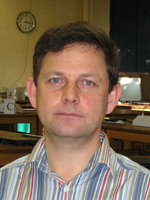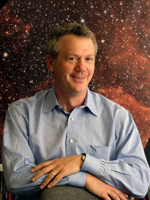Panelist Biographies
. Dr. Stephen Reynolds, North Carolina State University

Stephen Reynolds is a Professor of Physics at North Carolina State University. He graduated from Harvard College in 1971 and received his doctorate in physics from the University of California, Berkeley, combining his graduate studies with a career as a professional violinist in the Oakland Symphony and San Francisco Ballet Orchestra, and as a studio musician. After post-doctoral positions at the University of Virginia and the National Radio Astronomy Observatory, he came to North Carolina State in 1985 to found a research group in astrophysics. Since then NC State has become a leader in research on supernova remnants. Dr. Reynolds spent 2002-2003 as a Visiting Scientist at the Harvard-Smithsonian Center for Astrophysics and as a Senior Research Associate at NASA/Goddard Space Flight Center.
Dr. Reynolds has done theoretical and observational work on supernova remnants and pulsar-wind nebulae, using the Very Large Array and various orbiting observatories. With Roger Chevalier, he first proposed that X-ray synchrotron radiation might dominate some supernova remnant shells, a prediction amply verified and now used to study cosmic-ray origin. He is an Alumni Distinguished Undergraduate Professor at NC State, and a Fellow of the American Physical Society.
. Dr. Dave Green, University of Cambridge

Dave Green is a Senior Lecturer at the Cavendish Laboratory, the Department of Physics of the University of Cambridge. He completed a Ph.D. in the radio astronomy group at Cambridge in 1984, and has worked in Cambridge and at the Dominion Radio Astrophysical Observatory in Canada since then.
He has worked on a variety of observational topics, using a range of radio telescopes, and has a long standing interests in several aspects of Galactic supernova remnant research. These interests include maintaining a detailed catalog of such objects (currently containing 265 entries), which is a widely used reference work in this area of research. He also has an interest in historical records of Galactic supernovae from the last millennium or so, and has co-authored a book on this topic with an historian.
. Dr. Robert Kirshner, Harvard Smithsonian Center for Astrophysics

Robert P. Kirshner is Harvard College Professor of Astronomy and Clowes Professor of Science at Harvard University. He graduated from Harvard College in 1970 and received a Ph.D. in Astronomy at Caltech. He was a postdoc at the Kitt Peak National Observatory, and was on the faculty at the University of Michigan for 9 years. In 1986, he moved to the Harvard Astronomy Department. He served as Chairman of the Department from 1990-1997 and as the head of the Optical and Infrared Division of the CfA from 1997-2003. He was Master of Quincy House, one of Harvard’s undergraduate residences from 2001-2007. In 2007, he was on sabbatical at the Kavli Institute for Theoretical Physics at UC Santa Barbara.
Professor Kirshner is an author of over 200 research papers dealing with supernovae and observational cosmology. His work with the "High-Z Supernova Team" on the acceleration of the Universe was dubbed the "Science Breakthrough of the Year for 1998" by Science Magazine. Kirshner and the High-Z Team shared in the Gruber Prize for Cosmology in 2007. A member of the Amercian Academy of Arts and Sciences, he was elected to the National Academy of Sciences in 1998 and the American Philosophical Society in 2004. He served as President of the American Astronomical Society from 2003-2005. Kirshner was given the Distinguished Alumni Award by Caltech in 2004.
Kirshner is a frequent public lecturer on science. He is also the teacher of Science A-35, a core curriculum course for Harvard undergraduates entitled "The Energetic Universe." His popular-level book "The Extravagant Universe: exploding stars, dark energy, and the accelerating cosmos" was published by Princeton University Press. It won the AAP Award for Best Professional/Scholarly Book in Physics and Astronomy and was a Finalist for the 2003 Aventis Prize. The Extravagant Universe is now available in paperback and has been translated into Japanese, Portuguese, Spanish, and Czech.